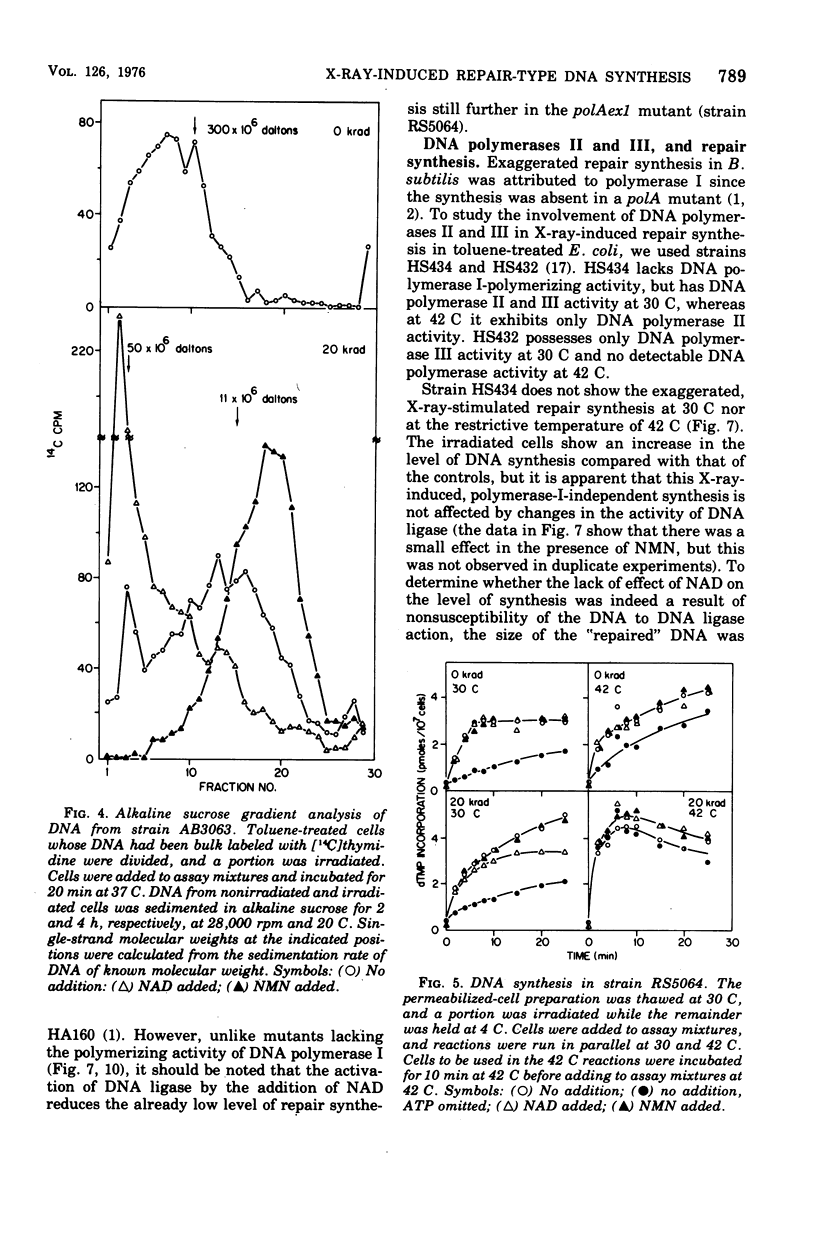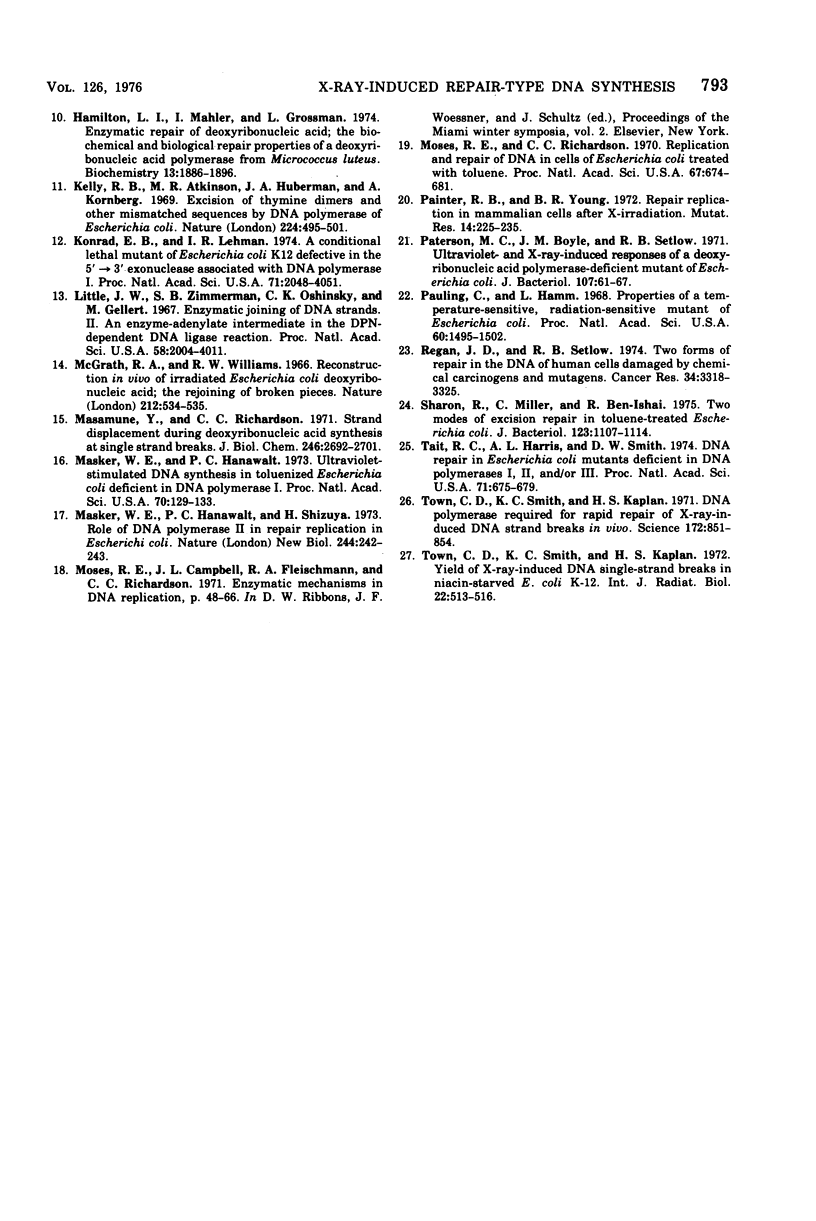Abstract
Toluene-treated Escherichia coli mutants have been used to study the roles of deoxyribonucleic acid (DNA) polymerases I, II, and III, and of DNA ligase in repair synthesis and strand rejoining following X-irradiation. In cells possessing all three DNA polymerases, both a greater amount of repair synthesis ("exaggerated" repair synthesis) and failure of ligation are observed when DNA ligase activity is inhibited. In a mutant lacking the polymerizing activity of DNA polymerase I, exaggerated repair synthesis is not observed, and strand rejoining does not occur even if DNA ligase is fully activated. In a mutant possessing the polymerizing activity of DNA polymerase I but lacking its 5'leads to 3' exonuclease activity, exaggerated repair synthesis is minimal. After irradiation, DNA polymerases II and III are capable of carrying out an adenosine 5'-triphosphate-dependent repair synthesis,but rejoining of strand breaks does not occur and exaggerated synthesis is not seen whether DNA ligase is active or not. These results suggest that DNA polymerase I and DNA ligase act together to limit repair synthesis after X irradiation and that both are necessary in toluene-treated cells for strand rejoining. DNA polymerases II and III apparently cannot complete chain elongation and gap filling, and therefore repair carried out by these enzymes does not respond to ligase action.
Full text
PDF








Selected References
These references are in PubMed. This may not be the complete list of references from this article.
- Billen D., Hellermann G. R., Stallions D. R. Role for deoxyribonucleic acid ligase in deoxyribonucleic acid polymerase i-dependent repair synthesis in toluene-treated escherichia coli. J Bacteriol. 1975 Oct;124(1):585–588. doi: 10.1128/jb.124.1.585-588.1975. [DOI] [PMC free article] [PubMed] [Google Scholar]
- Billen D., Hellermann G. R. X-ray-stimulated incorporation of (3H) thymidine triphosphate into DNA of toluenized Bacillus subtilis. Biochim Biophys Acta. 1974 Aug 29;361(2):166–175. doi: 10.1016/0005-2787(74)90344-x. [DOI] [PubMed] [Google Scholar]
- Billen D., Hellermann G. Depression by NAD of x-ray-induced repair-type DNA synthesis in toluene-treated Bacillus subtilis. Biochim Biophys Acta. 1975 Apr 2;383(4):379–387. doi: 10.1016/0005-2787(75)90307-x. [DOI] [PubMed] [Google Scholar]
- Billen D., Hewitt R. R., Lapthisophon T., Achey P. M. Deoxyribonucleic acid repair replication after ultraviolet light or x-ray exposure of bacteria. J Bacteriol. 1967 Nov;94(5):1538–1545. doi: 10.1128/jb.94.5.1538-1545.1967. [DOI] [PMC free article] [PubMed] [Google Scholar]
- Cooper P. K., Hanawalt P. C. Role of DNA polymerase I and the rec system in excision-repair in Escherichia coli. Proc Natl Acad Sci U S A. 1972 May;69(5):1156–1160. doi: 10.1073/pnas.69.5.1156. [DOI] [PMC free article] [PubMed] [Google Scholar]
- Dean C., Pauling C. Properties of a deoxyribonucleic acid ligase mutant of Escherichia coli: x-ray sensitivity. J Bacteriol. 1970 May;102(2):588–589. doi: 10.1128/jb.102.2.588-589.1970. [DOI] [PMC free article] [PubMed] [Google Scholar]
- Dürwald H., Hoffmann-Berling H. Endonuclease-I-deficient and ribonuclease I-deficient Escherichia coli mutants. J Mol Biol. 1968 Jul 14;34(2):331–346. doi: 10.1016/0022-2836(68)90257-x. [DOI] [PubMed] [Google Scholar]
- GILLIES N. E., ALPER T. The nucleic acid content of Escherichia coli strains B and B/r. Biochim Biophys Acta. 1960 Sep 23;43:182–187. doi: 10.1016/0006-3002(60)90428-5. [DOI] [PubMed] [Google Scholar]
- Glickman B. W., van Sluis C. A., Heijneker H. L., Rörsch A. A mutant of Escherichia coli K12 deficient in the 5'-3' exonucleolytic activity of DNA polymerase I. I. General characterization. Mol Gen Genet. 1973 Jul 31;124(1):69–82. doi: 10.1007/BF00267166. [DOI] [PubMed] [Google Scholar]
- Hamilton L., Mahler I., Grossman L. Enzymatic repair of deoxyribonucleic acid; the biochemical and biological repair properties of a deoxyribonucleic acid polymerase from micrococcus luteus. Biochemistry. 1974 Apr 23;13(9):1886–1896. doi: 10.1021/bi00706a017. [DOI] [PubMed] [Google Scholar]
- Konrad E. B., Lehman I. R. A conditional lethal mutant of Escherichia coli K12 defective in the 5' leads to 3' exonuclease associated with DNA polymerase I. Proc Natl Acad Sci U S A. 1974 May;71(5):2048–2051. doi: 10.1073/pnas.71.5.2048. [DOI] [PMC free article] [PubMed] [Google Scholar]
- Little J. W., Zimmerman S. B., Oshinsky C. K., Gellert M. Enzymatic joining of DNA strands, II. An enzyme-adenylate intermediate in the dpn-dependent DNA ligase reaction. Proc Natl Acad Sci U S A. 1967 Nov;58(5):2004–2011. doi: 10.1073/pnas.58.5.2004. [DOI] [PMC free article] [PubMed] [Google Scholar]
- Masamune Y., Richardson C. C. Strand displacement during deoxyribonucleic acid synthesis at single strand breaks. J Biol Chem. 1971 Apr 25;246(8):2692–2701. [PubMed] [Google Scholar]
- Masker W. E., Hanawalt P. C. Ultraviolet-stimulated DNA synthesis in toluenzied Escherichia coli deficient in DNA polymerase I. Proc Natl Acad Sci U S A. 1973 Jan;70(1):129–133. doi: 10.1073/pnas.70.1.129. [DOI] [PMC free article] [PubMed] [Google Scholar]
- Masker W., Hanawalt P., Shizuya H. Role of DNA polymerase II in repair replication in Escherichia coli. Nat New Biol. 1973 Aug 22;244(138):242–243. doi: 10.1038/newbio244242a0. [DOI] [PubMed] [Google Scholar]
- McGrath R. A., Williams R. W. Reconstruction in vivo of irradiated Escherichia coli deoxyribonucleic acid; the rejoining of broken pieces. Nature. 1966 Oct 29;212(5061):534–535. doi: 10.1038/212534a0. [DOI] [PubMed] [Google Scholar]
- Moses R. E., Richardson C. C. Replication and repair of DNA in cells of Escherichia coli treated with toluene. Proc Natl Acad Sci U S A. 1970 Oct;67(2):674–681. doi: 10.1073/pnas.67.2.674. [DOI] [PMC free article] [PubMed] [Google Scholar]
- Painter R. B., Young B. R. Repair replication in mammalian cells after x-irradiation. Mutat Res. 1972 Feb;14(2):225–235. doi: 10.1016/0027-5107(72)90049-8. [DOI] [PubMed] [Google Scholar]
- Paterson M. C., Boyle J. M., Setlow R. B. Ultraviolet- and X-ray-induced responses of a deoxyribonucleic acid polymerase-deficient mutant of Escherichia coli. J Bacteriol. 1971 Jul;107(1):61–67. doi: 10.1128/jb.107.1.61-67.1971. [DOI] [PMC free article] [PubMed] [Google Scholar]
- Pauling C., Hamm L. Properties of a temperature-sensitive radiation-sensitive mutant of Escherichia coli. Proc Natl Acad Sci U S A. 1968 Aug;60(4):1495–1502. doi: 10.1073/pnas.60.4.1495. [DOI] [PMC free article] [PubMed] [Google Scholar]
- Regan J. D., Setlow R. B. Two forms of repair in the DNA of human cells damaged by chemical carcinogens and mutagens. Cancer Res. 1974 Dec;34(12):3318–3325. [PubMed] [Google Scholar]
- Sharon R., Miller C., Ben-Ishai R. Two modes of excision repair in toluene-treated Escherichia coli. J Bacteriol. 1975 Sep;123(3):1107–1114. doi: 10.1128/jb.123.3.1107-1114.1975. [DOI] [PMC free article] [PubMed] [Google Scholar]
- Tait R. C., Harris A. L., Smith D. W. DNA repair in Escherichia coli mutants deficient in DNA polymerases I, II and-or 3. Proc Natl Acad Sci U S A. 1974 Mar;71(3):675–679. doi: 10.1073/pnas.71.3.675. [DOI] [PMC free article] [PubMed] [Google Scholar]
- Town C. D., Smith K. C., Kaplan H. S. DNA polymerase required for rapid repair of x-ray--induced DNA strand breaks in vivo. Science. 1971 May 21;172(3985):851–854. doi: 10.1126/science.172.3985.851. [DOI] [PubMed] [Google Scholar]
- Town C. D., Smith K. C., Kaplan H. S. Yield of x-ray-induced DNA single-strand breaks in niacin-starved E. coli K-12. Int J Radiat Biol Relat Stud Phys Chem Med. 1972 Nov;22(5):513–516. doi: 10.1080/09553007214551411. [DOI] [PubMed] [Google Scholar]


